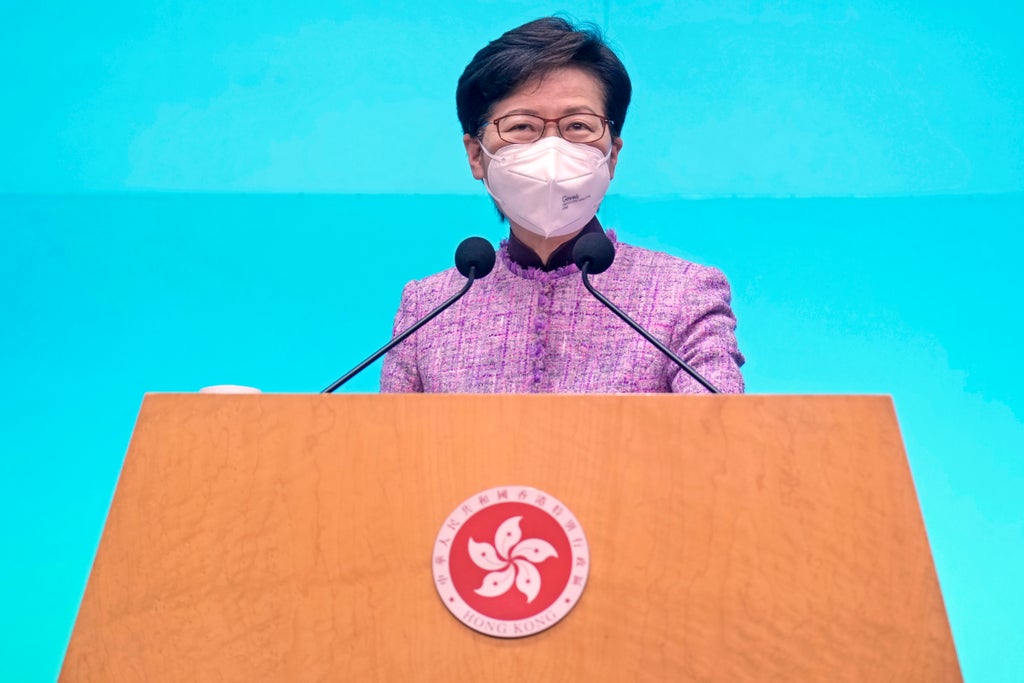
Hong Kong leader Carrie Lam announced Monday that she will step down in June after 42 years in government service, ending with a tumultuous 5-year term as the city's chief executive. Some highlights of Lam's life and career:
___
May 13, 1957: Born Cheng Yuet-ngor in Hong Kong. She attends St. Francis’ Canossian School, a Catholic girls’ school, where she failed only once to finish at the top of her class, and later said she cried because of it.
1980: Graduates from the University of Hong Kong and joins the Hong Kong government as a civil servant. During her career, she is known for having a strong work ethic.
1982: Studies at the University of Cambridge, where she meets her future husband, mathematician Lam Siu-por.
1984: Marries Lam Siu-por.
July 1, 1997: Britain returns Hong Kong to China. Under the one-China, two-systems framework, Hong Kong becomes a special administrative region with its own laws and system of government.
July 1, 2007: Appointed secretary for development. Renounces her British nationality as required under Chinese rule for senior officials of the Hong Kong government.
July 1, 2012: Appointed to the city's No 2 position, chief secretary for administration.
July 1, 2017: Sworn in by Chinese President Xi Jinping as Hong Kong's chief executive after winning 777 votes in March from a 1,194-member elections committee.
Feb. 2019: The Hong Kong government proposes amendments to the city's laws that would allow extraditions on a case-by-case basis to mainland China.
March 2019: Thousands take to the streets of Hong Kong to protest the extradition bill.
June 9, 2019: A massive protest against the bill draws more than 1 million people by organizers' estimates. Protests and political strife shake the city for more than six months.
Sept. 2019: Lam announces her government will withdraw the extradition bill. The protests continue over other issues, turning increasingly violent at times as demonstrators battle police in the streets.
June 2020: Beijing imposes a national security law on Hong Kong, outlawing secession, subversion, terrorism and colluding with foreign powers to intervene in the city's affairs.
July 31, 2020: Lam invokes an emergency regulations ordinance to postpone Legislative Council elections by a year, citing public health risks from the pandemic. The opposition pro-democracy camp accuses her of using the pandemic to delay a vote in which it expected to make gains.
Aug. 2020: The U.S. imposes sanctions on Lam and other Chinese and Hong Kong officials “for undermining Hong Kong’s autonomy and restricting the freedom of expression or assembly of the citizens of Hong Kong.” Lam later says she had to store “piles of cash” at home as she had no access to banking services.
May 2021: China revises Hong Kong’s election laws, reducing the proportion of those directly elected by voters to the legislature and ensuring that only those loyal to Beijing are allowed to run for office.
Dec. 2021: Voter turnout sinks to 30% in the delayed Legislative Council election, which returns a heavily pro-Beijing majority after the pro-democracy camp doesn't field any candidates.
Jan 2022-present: An omicron-driven outbreak overwhelms the health system, leading to more than 8,000 deaths. Lam's government is widely criticized for mishandling the outbreak.
April 4, 2022: Lam announces she will retire after her five-year term expires on June 30.







